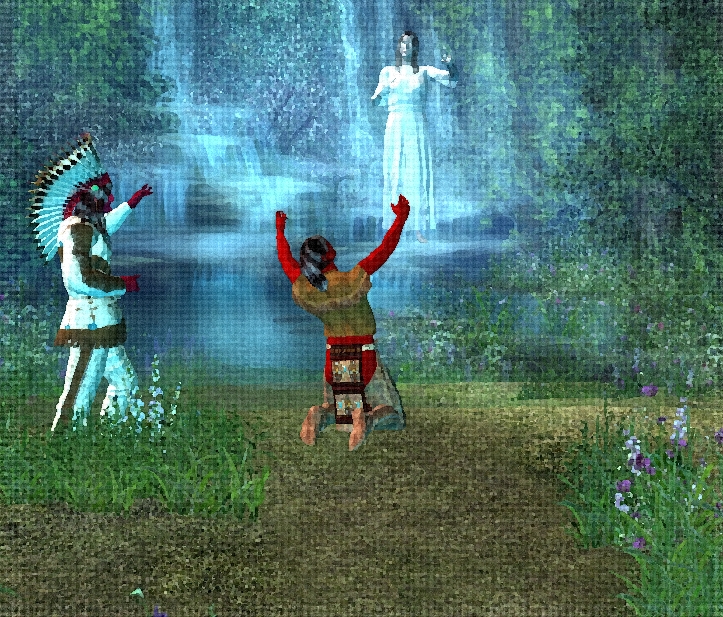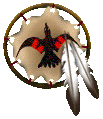|
Thanks to Blue Panther for sending me this Lore.
Please visit his Website at
http://groups.msn.com/KeeperofStories/
A Legend of Multnomah Falls - Multnomah
http://www.ilhawaii.net/~stony/296myths.html
Many years ago the head chief of the Multnomah people had a beautiful
young daughter. She was especially dear to her father because he had
lost all his sons in fighting, and he was now an old man. He chose her
husband with great care-a young chief from his neighbors, the Clatsop
people. To the wedding feast came many people from tribes along the
lower Columbia and south of it.
The wedding feast was to last for several days. There were swimming
races and canoe races on the river. There would be bow and arrow
contests, horse racing, dancing, and feasting. The whole crowd was merry,
for both the maiden and the young warrior were loved by the people.
But without warning the happiness changed to sorrow. A sickness came
over the village. Children and young people were the first victims, then
strong men became ill and died in one day. The wailing of women was
heard throughout the Multnomah village and the camps of the guests.
"The Great Spirit is angry with us," the people said to each other. The
head chief called together his old men with his warriors for council and
asked gravely, "What can we do to soften the Great Spirit's wrath?"
Only silence followed his question. At last one old medicine man arose.
"There is nothing we can do. If it is the will of the Great Spirit that
we die, then we must meet our death like brave men. The Multnomah have
ever been a brave people.
The other members of the council nodded in agreement-all except one, the
oldest medicine man. He had not attended the wedding feast and games,
but he had come in from the mountains when he was called by the chief.
He rose and, leaning on his stick, spoke to council. His voice was low
and feeble.
"I am a very old man, my friends; I have lived a long, long time. Now
you will know why. I will tell you a secret my father told me. He was a
great medicine man of the Multnomah, many summers and many snows in the
past.
"When he was an old man, he told me that when I became old, the Great
Spirit would send a sickness upon our people. All would die, he said,
unless a sacrifice was made to the Great Spirit. Some pure and innocent
maiden of the tribe, the daughter of a chief, must willingly give her
life for her people. Alone, she must go to a high cliff above Big River
and throw herself upon the rocks below. If she does this, the sickness
will leave us at once."
Then the old man said, "I have finished, my father's secret is told. Now
I can die in peace."
Not a word was spoken as the medicine man sat down. At last the chief
lifted his head. "Let us call in all the maidens whose fathers or
grandfathers have been headmen."
Soon a dozen girls stood before him, among them his own loved daughter.
The chief told them what the old medicine man had said. "I think his
words are the words of truth," he added.
Then he turned to his medicine men and his warriors, "Tell our people to
meet death bravely. No maiden shall be asked to sacrifice herself. The
meeting has ended."
The sickness stayed in the village and many more people died. The
daughter of the head chief sometimes wondered if she should be the one
to give her life to the Great Spirit. But she loved the young
warrior-she wanted to live.
A few days later she saw the sickness on the face of her lover. Now she
knew what she must do. She cooled his hot face, cared for him tenderly,
and left a bowl of water by his bedside. Then she slipped away alone,
without a word to anyone.
All night and all the next day she followed the trail to the great river.
At sunset she reached the edge of a cliff overlooking the water. She
stood there in silence for a few moments, looking at the jagged rocks
far below. Then she turned her face toward the sky and lifted up her
arms. She spoke aloud to the Great Spirit.
"You are angry with my people. Will you make the sickness pass away if I
give you my life? Only love and peace and purity are in my heart. If you
will accept me as a sacrifice for my people, let some token hang in the
sky. Let me know that my death will not be in vain and that the sickness
will quickly pass."
Just then she saw the moon coming up over the trees across the river. It
was the token. She closed her eyes and jumped from the cliff.
Next morning, all the people who had expected to die that day arose from
their beds well and strong. They were full of joy. Once more there was
laughter in the village and in the camps of the guests.
Suddenly someone asked, "What caused the sickness to pass away? Did one
of the maidens-?"
Once more the chief called the daughters and granddaughters of the
headmen to come before him. This time one was missing.
The young Clatsop warrior hurried along the trail which leads to Big
River. Other people followed. On the rocks below the high cliff they
found the girl they all loved. There they buried her.
Then her father prayed to the Great Spirit, "Show us some token that my
daughter's spirit has been welcomed into the land of the spirits."
Almost at once they heard the sound of water above. All the people
looked up to the cliff. A stream of water, silvery white, was coming
over the edge of the rock. It broke into floating mist and then fell to
their feet. The stream continued to float down in a high and beautiful
waterfall.
For many summers the white water has dropped from the cliff into the
pool below. Sometimes in winter the spirit of the brave and beautiful
maiden comes back to see the waterfall. Dressed in white, she stands
among the trees at one side of Multnomah Falls. There she looks upon the
place where she made her great sacrifice and thus saved her lover and
her people from death.
Clark, Ella. Indian Legends of the Pacific Northwest. Berkeley:
University of California Press, 1953.
Background and Dreamcatcher clipart here Courtesy of Sam Silverhawk,
Please visit his website by klicking at the banner below


